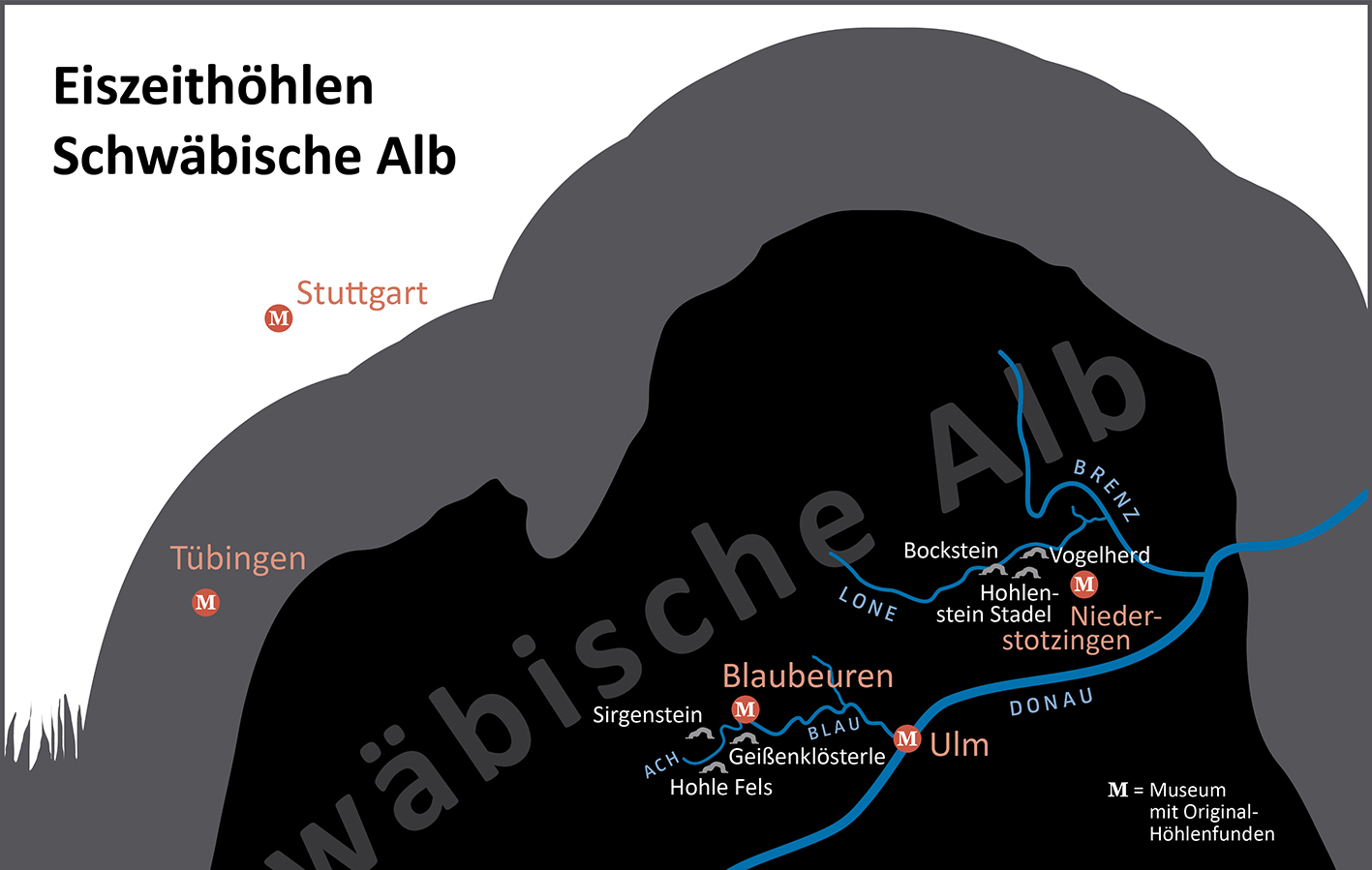News
10.07.2017
Swabian Ice Age caves declared World Heritage sites
UNESCO pays tribute to unique home of the world’s earliest 3D art - Tübingen University: “Well-deserved honor”
The United Nations Educational, Scientific and Cultural Organization has declared the caves of the Swabian Jura World Heritage sites. The UNESCO committee announced in Krakow, Poland, on Sunday that the Vogelherd, Bockstein, Hohlenstein-Stadel, Sirgenstein, Geissenklösterle and Hohle Fels caves would be added to the World Heritage list.
University of Tübingen archaeologists have been working in the caves since the early twentieth century, unearthing the earliest evidence of figurative art, music, and religious belief. The ivory figurines of animals and part-humans, the “Venus” of Hohle Fels, and the bone flute fragments were made during the last Ice Age, some 40,000 years ago. They are unique artifacts and invaluable to the study of human history.
“We are delighted with this news. The selection is recognition of decades of archaeological and palaeontological research at the University of Tübingen,” said the president, Professor Bernd Engler. “It shows once again that Tübingen conducts outstanding research in many fields, which is acknowledged internationally.”
Professor Nicholas Conard, Senckenberg Centre for Human Evolution and Palaeoenvironment at the University of Tübingen, called the UNESCO decision a well-deserved honor. Conard has headed work at the sites since 1996. “These finds from the Ice Age caves demonstrate an extraordinary creativity in the first modern humans. Tübingen researchers have invested a lot of dedicated work and have made the finds accessible to the public. It is an important signal to us that this unique landscape now counts as part of the World Heritage,” he said.
“A university which, with its museum, is a central part of the UNESCO World Heritage - I don’t think there is anything like it anywhere else in the world,” said Professor Ernst Seidel, Director of the University of Tübingen Museum (MUT).
Most of the original finds from the Ice Age caves can be viewed at the Museum Alte Kulturen at Hohentübingen Castle, including the many animal figurines of mammoth ivory and the newly-discovered fragment of a flute made from a bird bone. Pictures of the Ice Age figurines at the University of Tübingen Museum: <link https: www.dropbox.com sh btxi0sywvosbalp>www.dropbox.com/sh/btxi0sywvosbalp/AADSdxW3mMVD27Fz00U3Xeboa
Further original finds are at the Urgeschichtliche Museum URMU in Blaubeuren (<link http: www.urmu.de>www.urmu.de), Museum Ulm (<link http: www.museum-ulm.de>www.museum-ulm.de), Landesmuseum Württemberg, and Archäopark Vogelherd bei Niederstotzingen (<link http: www.archaeopark-vogelherd.de niederstotzingen>www.archaeopark-vogelherd.de/Niederstotzingen).
 | The 40,000 year old figurine of a wild horse from the Vogelherd cave is the iconic badge of the University of Tübingen Museum. Photo: Juraj Liptak / University of Tübingen |
Publications:
- Nicholas J. Conard, Harald Floss, Martina Barth, Jordi Serangeli (Hg.): Eiszeit. Kunst und Kultur (Begleitband zur Großen Landesausstellung Stuttgart), Ostfildern 2009
- Nicholas J. Conard, Michael Bolus, Ewa Dutkiewcz, Sibylle Wolf:
Eiszeitarchäologie auf der Schwäbischen Alb, Tübingen 2015 - Nicholas J. Conard: Das Vogelherdpferd und die Ursprünge der Kunst, Tübingen 2016
(engl.: The Vogelherd Horse and the Origins of Art, Tübingen 2016) - Ernst Seidl (Hg.): Schätze aus dem Schloss Hohentübingen, Tübingen 2012
(engl.: Treasures of Hohentübingen Castle, Tübingen 2014) - Nicholas J. Conard, Ernst Seidl (Hg.): Das Mammut vom Vogelherd, Tübingen 2008
Contact:
Professor Nicholas J. Conard PhD
University of Tübingen
Early Prehistory and Quaternary Ecology
<link>nicholas.conard@uni-tuebingen.de
Professor Dr. Ernst Seidl
University of Tübingen
University of Tübingen Museum (MUT)
Phone +49 7071 29-74134
Cell: 0172 7475040
<link>ernst.seidl@uni-tuebingen.de
<link https: www.unimuseum.uni-tuebingen.de>www.unimuseum.uni-tuebingen.de

